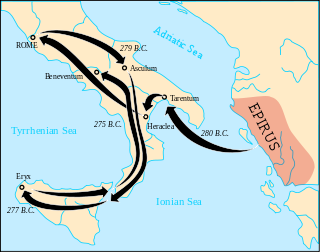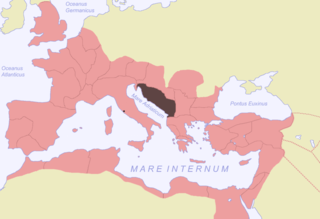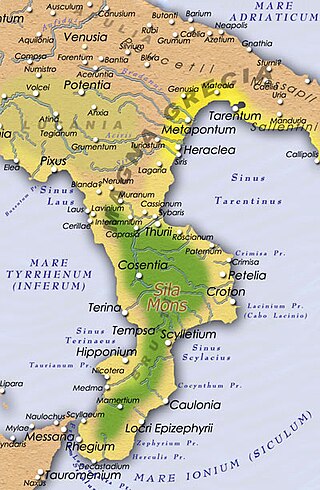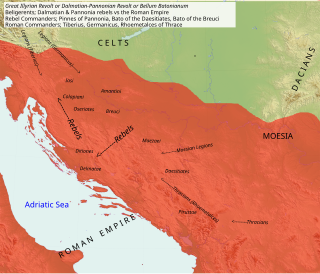Related Research Articles
6 was a common year starting on Friday of the Julian calendar. In the Roman Empire, it was known as the Year of the Consulship of Lepidus and Lucius Arruntius. The denomination "AD 6" for this year has been used since the early medieval period, when the Anno Domini calendar era became the prevalent method in Europe for naming years.
Salvius Tryphon was an aulos player who was proclaimed king by the rebelling slaves of ancient Sicily during the Second Servile War against Rome.

Lucius Calpurnius Piso Caesoninus was a prominent Roman senator of the early Empire. His tenure as pontifex led him sometimes to be called Lucius Calpurnius Piso Pontifex, to differentiate him from his contemporary, Lucius Calpurnius Piso the Augur, consul in 1 BC. He was a confidant of the emperors Augustus and Tiberius.

The Second Servile War was an unsuccessful slave uprising against the Roman Republic on the island of Sicily. The war lasted from 104 BC until 100 BC.

The Third Servile War, also called the Gladiator War and the War of Spartacus by Plutarch, was the last in a series of slave rebellions against the Roman Republic known as the Servile Wars. This third rebellion was the only one that directly threatened the Roman heartland of Italy. It was particularly alarming to Rome because its military seemed powerless to suppress it.
Cineas was a man from Thessaly and an important adviser of King Pyrrhus. He had a reputation for great wisdom and was a pupil of Demosthenes the orator and was the only man who could be compared in skill with Demosthenes. Pyrrhus held him in high regard. Cineas was an Epicurean according to Cicero and Plutarch. Plutarch wrote that Pyrrhus sent Cineas to many cities in Greece as an ambassador and "used to say that more cities had been won for him by the eloquence of Cineas than by his own arms; and he continued to hold Cineas in especial honour and to demand his services."

The gens Licinia was a celebrated plebeian family at ancient Rome, which appears from the earliest days of the Republic until imperial times, and which eventually obtained the imperial dignity. The first of the gens to obtain the consulship was Gaius Licinius Calvus Stolo, who, as tribune of the plebs from 376 to 367 BC, prevented the election of any of the annual magistrates, until the patricians acquiesced to the passage of the lex Licinia Sextia, or Licinian Rogations. This law, named for Licinius and his colleague, Lucius Sextius, opened the consulship for the first time to the plebeians. Licinius himself was subsequently elected consul in 364 and 361 BC, and from this time, the Licinii became one of the most illustrious gentes in the Republic.

The Battle of Asculum took place near Asculum in 279 BC between the Roman Republic under the command of the consuls Publius Decius Mus and Publius Sulpicius Saverrio, and the forces of King Pyrrhus of Epirus. The battle took place during the Pyrrhic War, after the Battle of Heraclea of 280 BC, which was the first battle of the war. There exist accounts of this battle by three ancient historians: Dionysius of Halicarnassus, Plutarch, and Cassius Dio. Asculum was in Lucanian territory, in southern Italy.

The Pyrrhic War was largely fought between the Roman Republic and Pyrrhus, the king of Epirus, who had been asked by the people of the Greek city of Tarentum in southern Italy to help them in their war against the Romans.

Illyricum was a Roman province that existed from 27 BC to sometime during the reign of Vespasian. The province comprised Illyria/Dalmatia in the south and Pannonia in the north. Illyria included the area along the east coast of the Adriatic Sea and its inland mountains, eventually being named Dalmatia. Pannonia included the northern plains that now are a part of Serbia, Croatia and Hungary. The area roughly corresponded to part or all of the territories of today's Albania, Kosovo, Montenegro, Serbia, Bosnia and Herzegovina, Croatia, and Slovenia.

The battle or, more precisely, the battles of Croton in 204 and 203 BC were, as well as the raid in Cisalpine Gaul, the last larger scale engagements between the Romans and the Carthaginians in Italy during the Second Punic War. After Hannibal’s retreat to Bruttium due to the Metaurus debacle, the Romans continuously tried to block his forces from gaining access to the Ionian Sea and cut his eventual escape to Carthage by capturing Croton. The Carthaginian commander struggled to retain his hold on the last efficient port which had remained in his hands after years of fighting and was ultimately successful.

The Bellum Batonianum was a military conflict fought in the Roman province of Illyricum in the 1st century AD, in which an alliance of native peoples of the two regions of Illyricum, Dalmatia and Pannonia, revolted against the Romans. The rebellion began among native peoples who had been recruited as auxiliary troops for the Roman army. They were led by Bato the Daesitiate, a chieftain of the Daesitiatae in the central part of present-day Bosnia and Herzegovina, and were later joined by the Breuci, a tribe in Pannonia led by Bato the Breucian. Many other tribes in Illyria also joined the revolt.
Cilician pirates dominated the Mediterranean Sea from the 2nd century BC until their suppression by Pompey in 67–66 BC. Because there were notorious pirate strongholds in Cilicia, on the southern coast of Asia Minor, the term "Cilician" was long used to generically refer to any pirates in the Mediterranean.

The wars of Augustus are the military campaigns undertaken by the Roman government during the sole rule of the founder-emperor Augustus. This was a period of 45 years when almost every year saw major campaigning, in some cases on a scale comparable to the Second Punic War, when Roman manpower resources were stretched to the limit. This period also saw expansion through diplomacy and annexation, without the direct use of military force. The result was a major expansion of the empire that Augustus inherited from the Roman Republic, although the attempted conquest of Germania ended in defeat despite the enormous deployment of resources involved. As a result of these campaigns, the Roman Empire assumed the borders it would hold, with a few modifications, for its entire history.

Nerva was Roman emperor from 96 to 98. Nerva became emperor when aged almost 66, after a lifetime of imperial service under Nero and the succeeding rulers of the Flavian dynasty. Under Nero, he was a member of the imperial entourage and played a vital part in exposing the Pisonian conspiracy of 65. Later, as a loyalist to the Flavians, he attained consulships in 71 and 90 during the reigns of Vespasian and Domitian, respectively. On 18 September 96, Domitian was assassinated in a palace conspiracy involving members of the Praetorian Guard and several of his freedmen. On the same day, Nerva was declared emperor by the Roman Senate. As the new ruler of the Roman Empire, he vowed to restore liberties which had been curtailed during the autocratic government of Domitian.
Lucius Licinius Lucullus was a politician and a general of the Roman Republic. He was the eldest son of Lucius Licinius Lucullus, the consul of 151 BC. He, however, did not achieve the political success of his father and failed to hold the consulship, reaching only the position of praetor in 104 BC. During his praetorship he first successfully put down the Vettian Revolt, a minor slave revolt in Campania, before being sent to take command in Sicily during the Second Servile War. He was later relieved of his command and prosecuted for embezzlement upon his recall to Rome. Being convicted, he was banished from the city and lived the remainder of his life in exile. He is the father of the more famous Lucius Licinius Lucullus, who defeated Mithridates and Tigranes in the Third Mithridatic War.
The gens Silia was a plebeian family at ancient Rome. Members of this gens are mentioned as early as the fifth century BC, but first to hold the consulship was Publius Silius Nerva, in the time of Augustus. The Silii remained prominent until the time of the Severan dynasty, in the early third century.
The gens Titinia was a minor plebeian family at ancient Rome. Members of this gens are mentioned as early as the time of the decemvirs, but only a few held any magistracies, and none of them ever attained the consulship.
The battle off Carteia was a minor naval battle during the latter stages of Caesar's Civil War won by the Caesarians led by Caesar's legate Gaius Didius against the Pompeians led by Publius Attius Varus.
The Siege of Apamea was a failed attempt by the Caesarians near the end of Caesar's Civil War to capture the rebel city of Apamea, Syria Secunda. Lucius Statius Murcus and Quintus Marcius Crispus led the attempt to capture the city, while Equite Quintus Caecilius Bassus led the defence of the city.
References
- ↑ Cassius Dio, Roman History, Book 27, Fragment 101
- 1 2 3 Duncan, Mike (2017). The storm before the storm : the beginning of the end of the Roman Republic (First ed.). New York: PublicAffairs. p. 132. ISBN 9781610397216. OCLC 972386931.
- ↑ Cassius Dio, The Actions of the Roman Governor of Sicily, Publius Licinius Nerva, in 104 B.C., Third Century A.D. In Brent D. Shaw (ed), Spartcus and the Slave Wars: A Brief History with Documents (The Bedford Series in History and Culture) (pp. 121-122). Palgrave Macmillan: Boston; New York.
- ↑ Diodorus Siculus, Bibliotheca Historica, 36,8; A. H. Beesely, The Gracchi, Marius, and Sulla Epochs of Ancient History, VI, p. 57